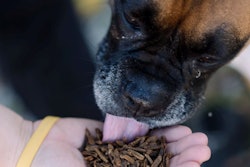
WoofWhiskers surveyed dog owners currently using cannabidiol (CBD) oil for their pets. Over two weeks in late October, 290 respondents answered questions about cost, usage and other aspects of CBD oil supplements for dogs. Survey participants reported spending US$42 on CBD oils per month.
Overall, 86% of respondents said they saw positive health benefits to their dogs from using CBD oil products. Some did note negative side effects though. The largest group, 14%, stated that the CBD caused drowsiness in their dogs. Four percent said their dogs suffered from dry mouth, while another 4% observed other side effects.
As for the perceived positive effects, dog owners reported giving CBD oil to pets for a variety of reasons. The top was anxiety and stress at 46%. Next was pain at 25%. Other reasons for using CBD oil for pets included seizures (7%), cancer (7%), digestive (4%) and other issues (57%). Some of those other reasons included arthritis, heart disease and old age. Most of the dogs received CDB oil daily at 61%. Weekly CBD dog dosages occurred in 18% of respondents, while 21% rarely gave CBD oil to their dogs. More than half of respondents, 57%, reported using CBD oil for themselves in the WoofWhiskers’ survey.
13 CBD pet product companies warned by FDA
Regardless of people’s reasons for using the chemical for themselves and their pets, CBD oil products in the United States must adhere to federal regulations, or face consequences. In November, Thirteen companies making CBD products for pets were among the 15 warned by the U.S. Food and Drug Administration that their sales of CBD-containing pet and human items violated the Federal Food, Drug, and Cosmetic Act (FD&C Act).
In many of these warning letters, the FDA noted that the the presentation and marketing of these brands of CBD pet products means that the items, "are drugs under section 201(g)(1) of the FD&C Act, 21 U.S.C. 321(g)(1), because they are intended for use in the diagnosis, cure, mitigation, treatment, or prevention of disease in animals and/or intended to affect the structure or any function of the body of an animal. Further, as discussed below, these products are unapproved new animal drugs and marketing them violates the FD&C Act." FDA officials used marketing materials posted on CBD pet product companies' websites for many of these assessments.
FDA officials also announced that the agency would not classify CBD as generally recognized as safe (GRAS), which would have allowed the ingredient to be used in foods based on historical human and animal use. The agency stated that it lacked sufficient empirical evidence supporting the safety of CBD consumption.

















